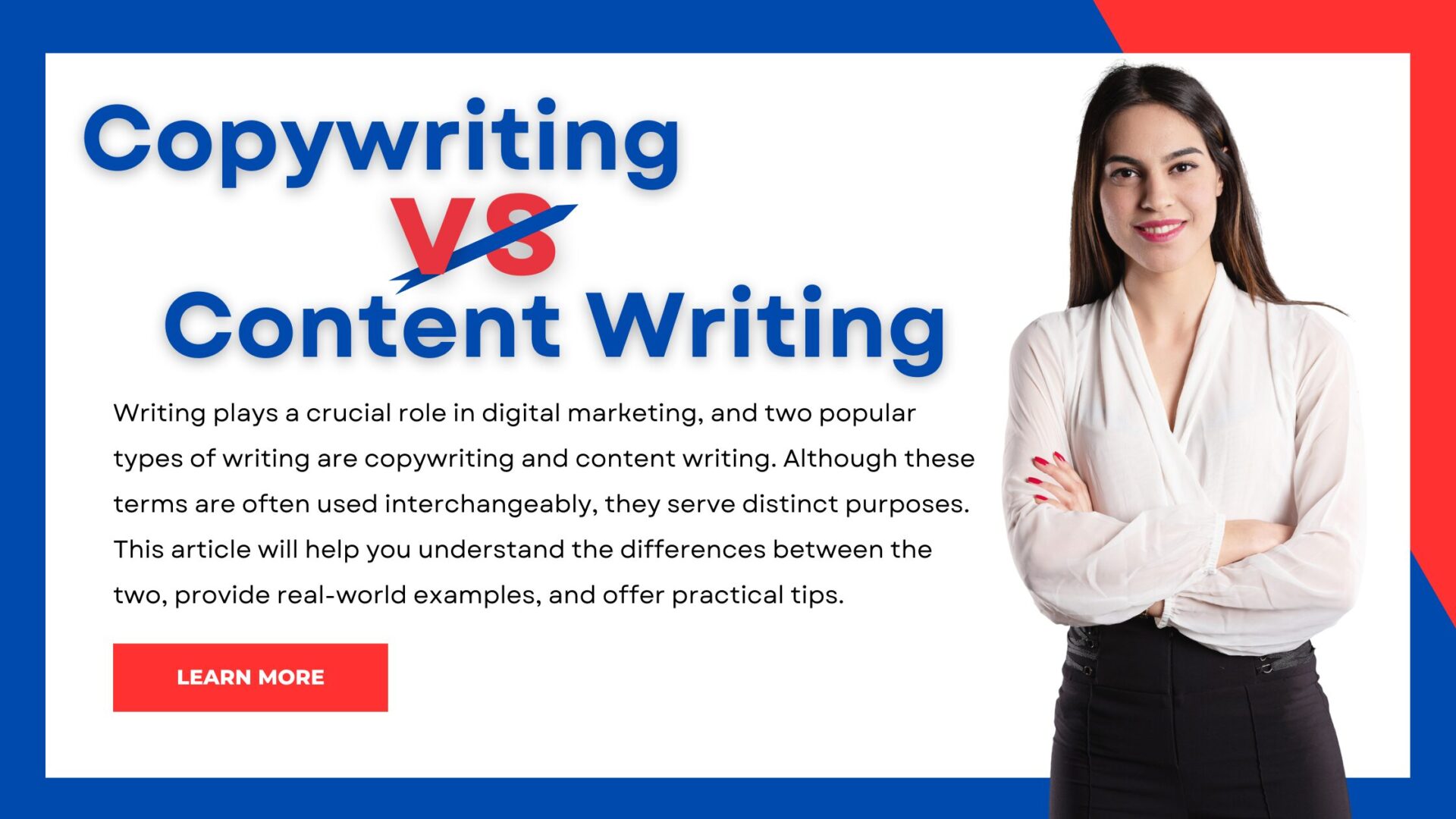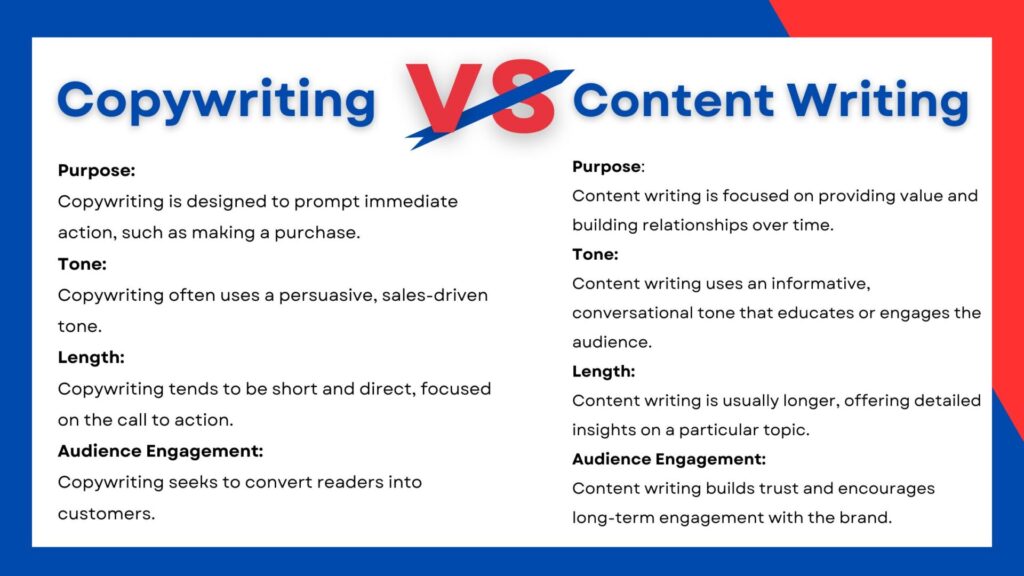
When it comes to online marketing, copywriting, and content writing often get confused. Though they share similarities, both serve distinct purposes. Although these terms are often used interchangeably, they serve distinct purposes.
Quick View
This article will help you understand the differences between the two, provide real-world examples, and offer practical tips.
What is Copywriting vs Content Writing?
Copywriting is all about persuasion. It focuses on convincing the reader to take a specific action. That action could be buying a product, signing up for a newsletter, or downloading an app. The primary goal of copywriting is to generate leads and sales.
Content writing, on the other hand, is about providing valuable information. The purpose is to educate, entertain, or inform the reader, without directly pushing them to make a purchase. Content writing aims to build trust with the audience over time and improve brand awareness.
Real-World Example
A study by HubSpot shows that businesses with regular blog content get 55% more website visitors than those without. This highlights the importance of content writing in driving traffic and engagement.
Definition of a Content Writer
A content writer creates informative, engaging content for online platforms. Their work includes blog posts, articles, social media posts, and website pages. The aim is to provide value to the audience, helping them solve problems or learn more about a specific topic.
Content Writing Definition
Content writing involves the process of creating text for digital media. The main goal is to engage the reader through informative, educational, or entertaining content. Content writers focus on long-term brand building by offering insights, advice, and knowledge.
Web Content Writing Definition
Web content writing refers to writing material specifically for websites. This includes homepage content, product descriptions, landing pages, and blog posts. The goal is to attract readers, keep them on the site, and encourage them to explore further.
What Does a Copywriter Do?
A copywriter specializes in creating persuasive and engaging text. Their work often involves writing sales pages, email campaigns, product descriptions, and advertisements. The main goal of a copywriter is to increase conversions and drive immediate action from the reader.
Copywriting or Copy Writing?
The correct term is copywriting (one word), which refers to the act of writing promotional or sales-oriented content.
Key Differences Between Copywriting & Content Writing

- Purpose:
- Copywriting is designed to prompt immediate action, such as making a purchase.
- Content writing is focused on providing value and building relationships over time.
- Tone:
- Copywriting often uses a persuasive, sales-driven tone.
- Content writing uses an informative, conversational tone that educates or engages the audience.
- Length:
- Copywriting tends to be short and direct, focused on the call to action.
- Content writing is usually longer, offering detailed insights on a particular topic.
- Audience Engagement:
- Copywriting seeks to convert readers into customers.
- Content writing builds trust and encourages long-term engagement with the brand.
Example of a Content Writing
A well-written blog post that provides helpful tips on how to improve productivity is an excellent example of content writing. It’s not directly selling a product, but it helps the reader with valuable information, establishing trust with the brand.
Content Writing Tips for Beginners
If you’re just starting with content writing, these tips can help you create more engaging and effective content:
- Know Your Audience: Always write with your target audience in mind. Tailor your content to their needs.
- Structure Your Writing: Break your content into clear headings and subheadings to improve readability.
- Keep Sentences Short: Aim for concise sentences to enhance clarity and engagement.
- Proofread and Edit: Never publish without thoroughly reviewing your work for errors.
Blog Content Writing Tips
- Focus on SEO: Incorporate relevant keywords naturally without overstuffing.
- Be Consistent: Posting regularly keeps your audience engaged and improves your website’s SEO.
- Engage Your Audience: Ask questions or encourage feedback to create interaction.
Content Marketing Writing Tips
- Know Your Brand’s Voice: Ensure consistency across all platforms in tone and style.
- Offer Solutions: Always provide actionable advice that helps solve your audience’s problems.
- Use Storytelling: Tell relatable stories to create an emotional connection with your readers.
SEO Content Writing Tips
- Use Keywords Wisely: Research and place keywords naturally within your content for better search engine rankings.
- Optimize for Readability: Keep paragraphs short, use bullet points, and add visuals.
- Include Internal and External Links: Linking to relevant pages boosts both SEO and reader engagement.
How to Write Book Content
Writing a book requires a different approach than writing for the web. Start by outlining your chapters and structuring your ideas. Stay focused on your target audience, and use a consistent voice throughout. Incorporate real-world examples, case studies, or expert opinions to enrich your content.
AI Content Writer: How to Become One?
AI technology has changed the way content is produced. To become an AI content writer, you need to understand AI tools like GPT-3, and GPT-4. These tools can help speed up the content creation process, but remember, human oversight is essential for creativity and authenticity. AI writing assistants are useful, but they should complement, not replace — human input.
Summary
Both copywriting and content writing are essential components of digital marketing. Copywriting focuses on persuasion and driving immediate action, while content writing is about providing long-term value and building trust.
Understanding the differences between these two types of writing is crucial for creating successful digital content strategies. By using these tips and applying real-world examples, you can master both skills and increase your writing for any audience.
FAQs
What is the main difference between copywriting and content writing?
Copywriting focuses on persuading the reader to take action, while content writing aims to inform, educate, or engage.
Which writing style is used for sales and conversions?
Copywriting is used for driving sales and conversions through persuasive language.
What is content writing typically used for?
Content writing is used to build trust and provide valuable information to the audience, often through blog posts, articles, or guides.
What does a copywriter do?
A copywriter creates persuasive content like ads, landing pages, and email campaigns to prompt action.
What does a content writer do?
A content writer produces educational or engaging material, such as blogs or articles, to attract and retain readers.
Which writing style is better for SEO?
Content writing is more effective for SEO because it often includes keywords and longer, informative pieces that improve search rankings.
Is storytelling important in copywriting or content writing?
Storytelling is important in both but is more commonly used in content writing to engage readers.
Can AI replace human writers in content creation?
AI can assist in content creation, but human input is crucial for creativity, accuracy, and authenticity.
How can a beginner improve in content writing?
A beginner can improve by knowing their audience, using clear structures, keeping sentences short, and proofreading thoroughly.
What is web content writing?
Web content writing involves creating content specifically for websites, including homepages, blogs, and product pages.




